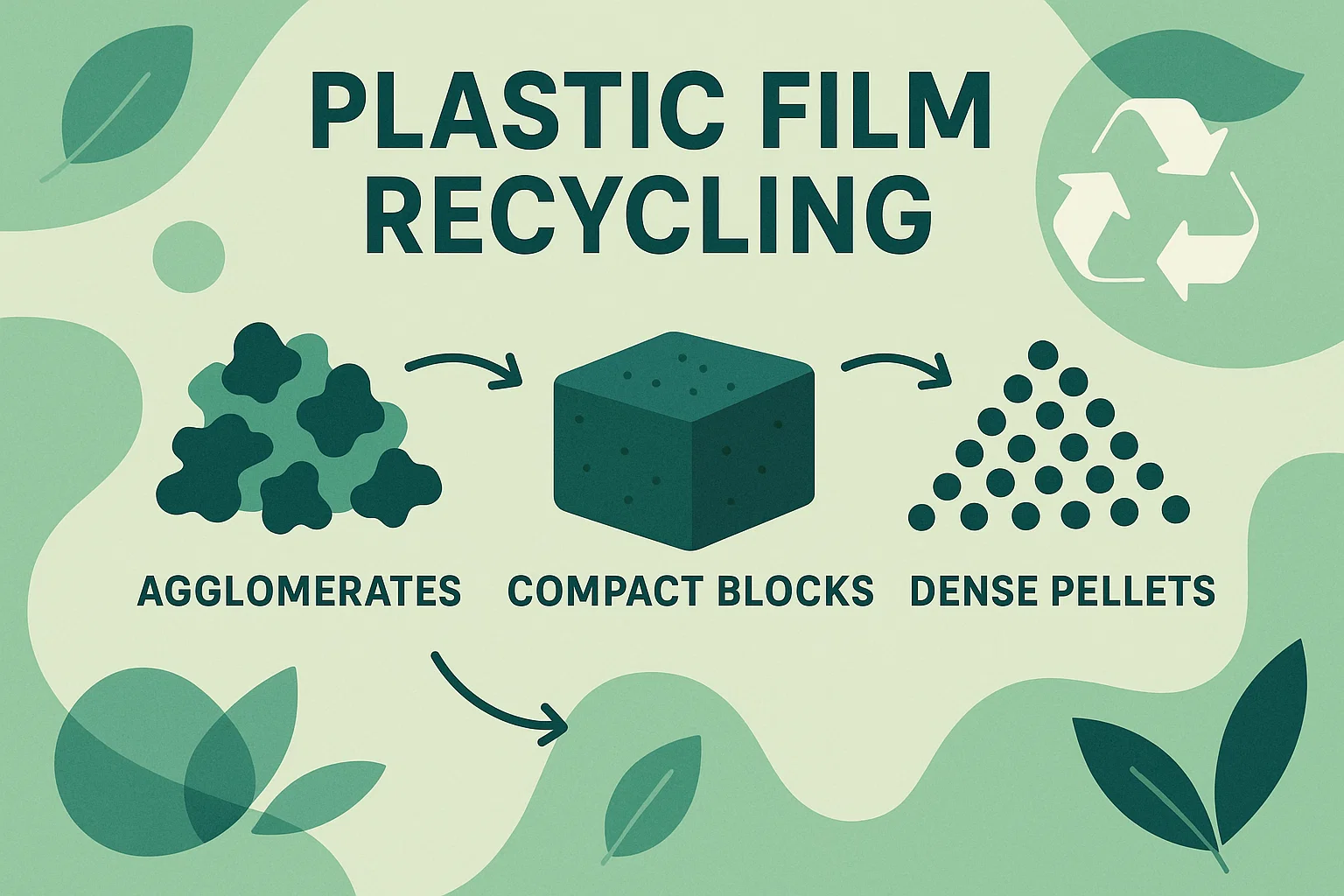Film Agglomerator vs. Compactor vs. Screw Press Densifier: Which is Right for Your Recycling Line?
Choosing between a Film Agglomerator, a Compactor, or a Screw Press Densifier is a critical decision for any plastic recycling operation. Low-density materials like PE and PP films are notoriously difficult to handle. The right densification equipment transforms these challenging materials into a consistent, manageable feedstock, directly impacting your operational efficiency and profitability. This guide provides a clear comparison to help you select the ideal machine for your specific material and processing goals.
The Core Challenge: Why Densification is Essential
Plastic films present a unique set of problems. Their high volume-to-weight ratio leads to high transportation costs. Furthermore, feeding light, fluffy film directly into an extruder is often impossible. Densification equipment solves these problems by increasing the bulk density of the material, making it easier to store, transport, and process. According to the Association of Plastic Recyclers (APR), proper densification is a fundamental step for producing high-quality recycled resins.
1. Deep Dive: The Film Agglomerator
A Film Agglomerator uses friction to heat, soften, and fuse plastic film into dense, popcorn-like “agglomerates.” Blades rotating at high speed generate intense friction, and a spray of water creates a thermal shock, causing the softened plastic to shrink and densify.
Best For:
Its strength is handling materials with some contamination, as the heat helps burn off minor residues. Ideal for moderately soiled films or washed films that retain some moisture.
Advantages
- Handles light to moderate contamination effectively.
- Produces dense, uniform agglomerates ideal for extruders.
- The thermal process removes some moisture and impurities.
Disadvantages
- Higher energy consumption than mechanical methods.
- Risk of material degradation if not controlled properly.
- Requires more operator attention.
Learn more about the Energycle Plastic Agglomerator.
2. The Mechanical Approach: The Film Compactor
A Film Compactor, often a Cutter-Compactor integrated with an extruder, uses mechanical force to densify plastic. It cuts, mixes, and pre-compacts material through friction, then feeds it directly into the extruder screw. This is a “cold” process relative to an agglomerator.
Best For:
Compactors excel with clean, dry, and uniform waste streams, such as post-industrial scrap. Since there’s no melting phase, input material quality is crucial.
Advantages
- Highly energy-efficient, avoiding a separate heating stage.
- Preserves material quality with minimal thermal stress.
- Creates a high-throughput, continuous feed for an extruder.
Disadvantages
- Not suitable for dirty, wet, or mixed plastic waste.
- An integrated part of a line, not a standalone product.
- Contaminants can cause excessive wear.
Explore our all-in-one Cutter-Compactor Recycling Line.
3. High-Density Solution: The Screw Press Densifier
A Screw Press Densifier (or squeezer) is a specialized machine to both dewater and densify. A powerful screw pushes wet film forward, squeezing out water while friction heats and softens the plastic. It produces very dense, dry, semi-molten chunks.
Best For:
This machine is the undisputed champion for handling wet materials directly from a washing line. It is essential for any large-scale film washing operation.
Advantages
- Excellent dewatering (reduces moisture to <5%).
- Produces the highest density output.
- Improves the efficiency of downstream pelletizing.
Disadvantages
- Higher initial investment and maintenance costs.
- Primarily focused on wet materials.
- High energy consumption due to pressure and friction.
See the Energycle Screw Press Squeezer & Densifier in action.
Head-to-Head Comparison: A Practical Guide
To simplify your decision, here is a direct comparison of the three machines across key operational factors.
| Feature | Film Agglomerator | Film Compactor (Cutter-Compactor) | Screw Press Densifier |
|---|---|---|---|
| Primary Mechanism | Frictional heat & cutting | Mechanical cutting & compaction | High-pressure screw & dewatering |
| Best for Input Material | Moderately contaminated, semi-wet film | Clean, dry, uniform film scrap | Very wet, washed film |
| Output Density | High | Medium (pre-extrusion) | Very High |
| Key Advantage | Handles some contamination | Energy efficiency & high throughput | Superior dewatering |
Making the Right Choice: Your Decision Checklist
Your choice depends entirely on your operation. Ask yourself these key questions:
- What is the condition of my film? For very wet film from a wash line, the Screw Press Densifier is essential. For clean, dry industrial scrap, a Cutter-Compactor is most efficient. For mixed post-consumer film, the Agglomerator offers flexibility.
- What is my downstream process? For an all-in-one system, choose the Cutter-Compactor line. For preparing feedstock for a separate pelletizer, the Agglomerator or Screw Press Densifier are perfect.
- What is my top priority? If it’s water removal, choose the Screw Press Densifier. If it’s energy efficiency for clean material, choose the Cutter-Compactor. If it’s versatility for imperfect material, choose the Agglomerator.
Partnering with Energycle Machine for Your Success
At Energycle Machine, we build equipment that performs reliably in demanding recycling environments. Our solutions are engineered for durability, efficiency, and ease of maintenance, helping you get the maximum value from your materials.
Frequently Asked Questions (FAQ)
Q1: Which machine is best for recycling very wet plastic film?The Screw Press Densifier is specifically designed for this purpose, using immense pressure to squeeze out water.
Q2: Can I feed agglomerates directly into an injection molding machine?No. Agglomerates are an intermediate material that must first be run through a pelletizing extruder to create uniform pellets suitable for molding.
Build a More Efficient Recycling Line Today
Optimizing your film densification process is a direct investment in your bottom line. Let our experts help you analyze your needs and find the perfect solution.
Request a Personalized Consultation

